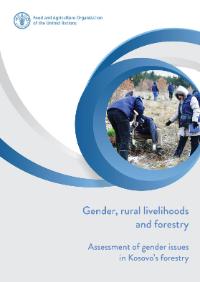Focal point
Location
The Food and Agriculture Organization of the United Nations leads international efforts to defeat hunger. Serving both developed and developing countries, FAO acts as a neutral forum where all nations meet as equals to negotiate agreements and debate policy. FAO is also a source of knowledge and information. We help developing countries and countries in transition modernize and improve agriculture, forestry and fisheries practices and ensure good nutrition for all. Since our founding in 1945, we have focused special attention on developing rural areas, home to 70 percent of the world's poor and hungry people.
Members:
Resources
Displaying 666 - 670 of 5074Informing Future Interventions for Scaling-up Sustainable Land Management.
The review was conducted with the aim to provide guidance for future engagement / investments, in particular in the context of recent AU declarations on agriculture and on land restoration by NEPAD, GEF, TerrAfrica, the Great Green Wall Initiative for the Sahel and Sahara (GGWISS), UN agencies and other donors.
This paper provides an abridged summary of the findings for easier access by country policy / decision
makers, agencies, development partners and donors, as a basis for informing future interventions for scaling-
up sustainable land management (SLM).
Land and water days 2015 - FAO synthesis report
As World leaders forged two new big deals in late 2015 – the Sustainable Development Goals (SDGs) and the Climate Change Agreements – over 200 experts and technical officers working in fields related to land and water management, participated in the 3rd Land and Water Days held at the Food and Agriculture Organization of the United Nations (FAO) Headquarters in Rome, from 10 to 12 November 2015.
Governing Tenure Rights to Commons: A guide to support the implementation of the Voluntary Guidelines on the Responsible Governance of Tenure of Land, Fisheries and Forests in the Context of National Food Security
The Voluntary Guidelines on the Responsible Governance of Tenure of Land, Fisheries and Forests in the Context of National Food Security (FAO, 2012 – referred to in this guide as ‘the Guidelines’) were unanimously adopted by the Committee on World Food Security (CFS) in 2012, with subsequent broad international recognition and support. Their strength rests on the unique inclusive and participatory process through which they were developed.
Governing Tenure Rights to Commons: A guide to support the implementation of the Voluntary Guidelines on the Responsible Governance of Tenure of Land, Fisheries and Forests in the Context of National Food Security
The Voluntary Guidelines on the Responsible Governance of Tenure of Land, Fisheries and Forests in the Context of National Food Security (FAO, 2012 – referred to in this guide as ‘the Guidelines’) were unanimously adopted by the Committee on World Food Security (CFS) in 2012, with subsequent broad international recognition and support. Their strength rests on the unique inclusive and participatory process through which they were developed.
Gender, rural livelihoods and forestry
The main purposes of this research are to identify and analyse the role of women and men in the forestry sector in Kosovo, and women’s and men’s ownership and use of forests. The report also aims to analyse the gender issues within the institutional policy and legal framework that governs forest management, in order to provide recommendations on how to mainstream gender in forest policies in Kosovo more effectively.








